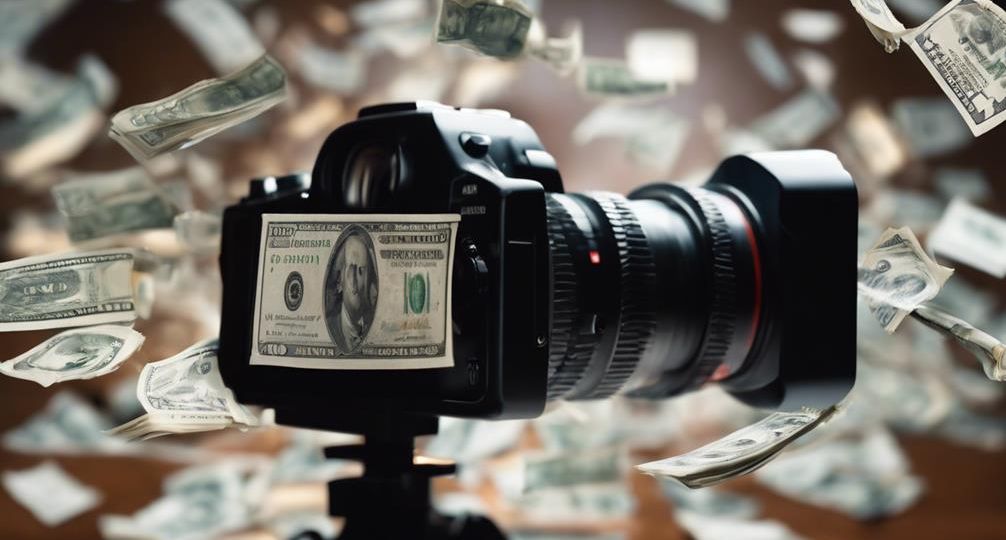
Can you be sued as a Youtuber?
Imagine yourself as a sailor navigating the vast ocean of YouTube, where the waves of content are as unpredictable as the tides.
Yes, you can be sued as a YouTuber. It’s not just about uploading videos and reaping the benefits; there are legal landmines like copyright infringement, defamation, privacy violations, and more that you could unwittingly step on.
But what exactly does this mean for you and your channel? Let’s explore this uncharted territory together.
Key Takeaways
- Yes, YouTubers can face lawsuits for copyright infringement, defamation, privacy violations, false advertising, and online harassment.
- Copyright violations can lead to legal consequences, including potential fines and lawsuits.
- Misleading promotions, false advertising, and improper handling of privacy can result in serious legal repercussions for YouTubers.
- YouTubers can be held accountable for online harassment, and such actions can lead to legal consequences and damage to their reputation.
Understanding YouTube’s Legal Landscape
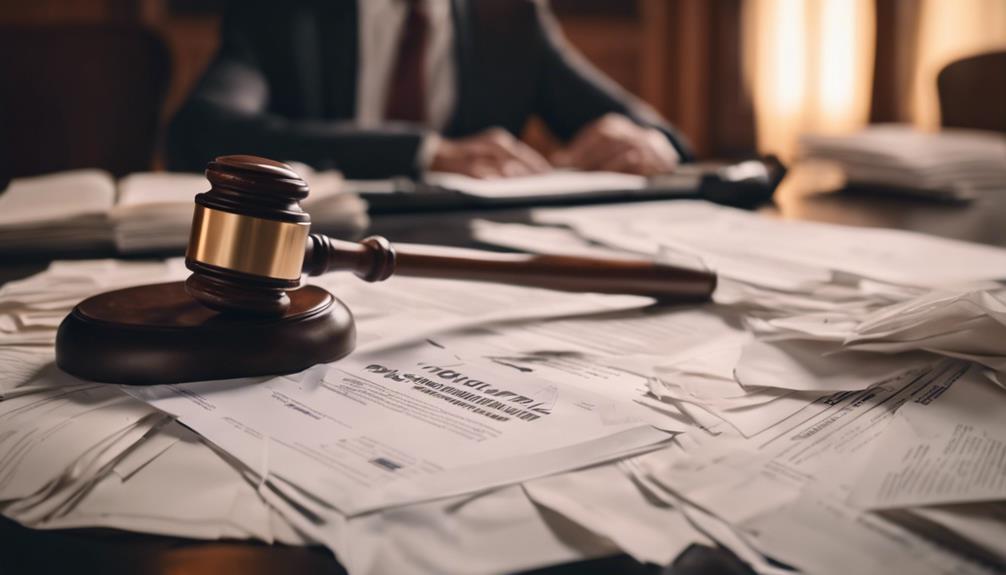
To fully grasp the potential legal repercussions you might face as a YouTuber, it’s crucial to first understand the legal landscape of YouTube itself. As a platform, YouTube has its own set of rules and regulations, known as content regulation, that you’re required to abide by. If you fail to comply, YouTube reserves the right to take necessary actions, including the removal of your content or terminating your account.
However, the concept of platform accountability is also pivotal. While YouTube is responsible for the overall management of the platform, you, as a content creator, share in this accountability. You’re expected to respect the rights of others, ensure your content doesn’t violate any laws, and adhere to the terms of service and community guidelines set by YouTube.
In this rapidly evolving digital age, it’s vital to stay updated with any changes in these regulations and understand their implications. Being innovative doesn’t mean pushing the boundaries of legality. Instead, it’s about creating unique, engaging content within the parameters set by YouTube. By doing so, you can avoid potential legal issues and enjoy a successful YouTube career.
Copyright Infringement Issues
One of the most common legal pitfalls you might encounter as a YouTuber is copyright infringement. This issue typically arises when you incorporate copyrighted material, such as music or video clips, into your content without appropriate permission or licensing. For instance, music licensing can be a complex terrain to navigate. If you’re not careful, you could find yourself facing hefty fines, or worse, a lawsuit.
Now, you might be thinking, ‘What about the Fair Use Doctrine?’ Well, it’s not a get-out-jail-free card. The Fair Use Doctrine is a legal principle that allows limited use of copyrighted material without permission, often for purposes such as criticism, commentary, news reporting, or educational research. However, its application isn’t always clear-cut. It depends on various factors, including the purpose of the use, the nature of the copyrighted work, the amount used, and the impact on the market for the original work.
Defamation Lawsuits and YouTube
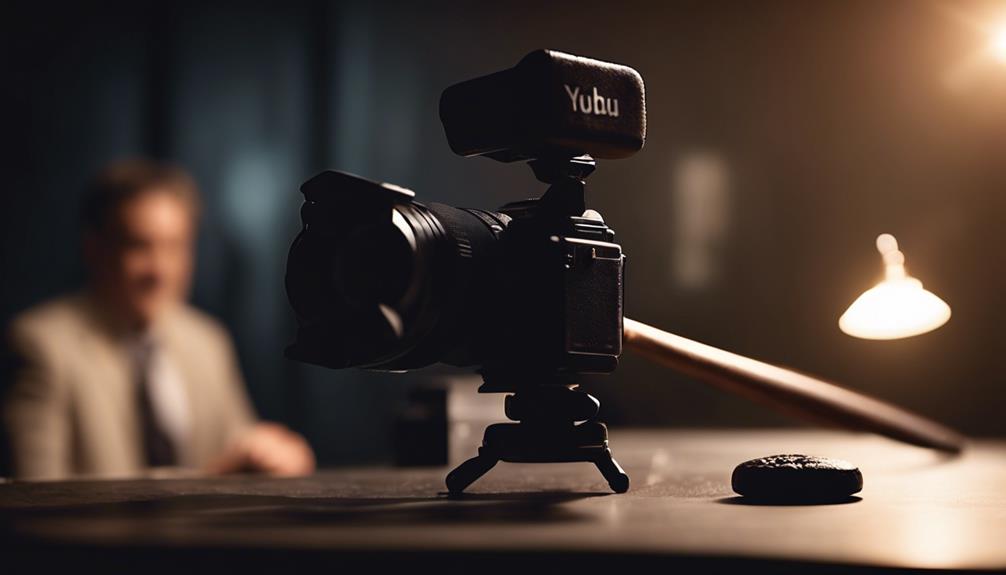
As a YouTuber, understanding defamation and how it applies to your content is crucial.
You’ll need to know how to prevent publishing defamatory content and to handle any accusations of defamation that may arise.
This understanding can protect you from potential lawsuits and ensure your YouTube channel’s longevity.
Understanding Defamation on YouTube
Navigating the murky waters of defamation on YouTube can land you in a legal quagmire, particularly if you’re not familiar with the laws governing this area. A thorough understanding of defamation case studies can illuminate the potential risks and the severe impact on your channel’s reputation.
Defamation, simply put, is the act of damaging another’s reputation by making false statements. YouTube, with its global reach, has become a hotbed for such cases. You can be sued for defamation if the content posted is untrue and harms someone’s reputation. It’s essential to note that truth is a defense to a defamation claim. However, proving truth can be complex and costly.
Therefore, understanding the dynamics of defamation on YouTube is crucial for content creators.
Preventing Defamatory Content
To mitigate the risk of becoming entangled in defamation lawsuits as a YouTuber, it’s imperative that you take proactive measures to prevent the creation and spread of defamatory content on your channel. Three crucial steps to consider are:
- Implementing Content Moderation Strategies: Develop a system to review and monitor all content before it’s published, ensuring it doesn’t contain any potentially harmful allegations.
- Promoting Responsible Video Production: Encourage responsible content creation by educating yourself and your team on defamation laws and the consequences of violating them.
- Ensuring Thorough Fact-Checking: Always verify the accuracy of all information presented in your videos, especially when it involves others.
Handling Defamation Accusations
When you’re hit with defamation accusations as a YouTuber, it’s crucial to know how to properly handle the situation to minimize potential damage.
Start by consulting a lawyer to understand your legal position. If you’re found at fault, defamation insurance can cover legal costs and any damages awarded. However, prevention remains key.
Upholding social media ethics isn’t just morally right, it’s also legally safe. Always verify your content for accuracy, respect others’ privacy, and avoid making damaging false statements. Being innovative doesn’t mean crossing ethical lines.
Privacy Violations on YouTube
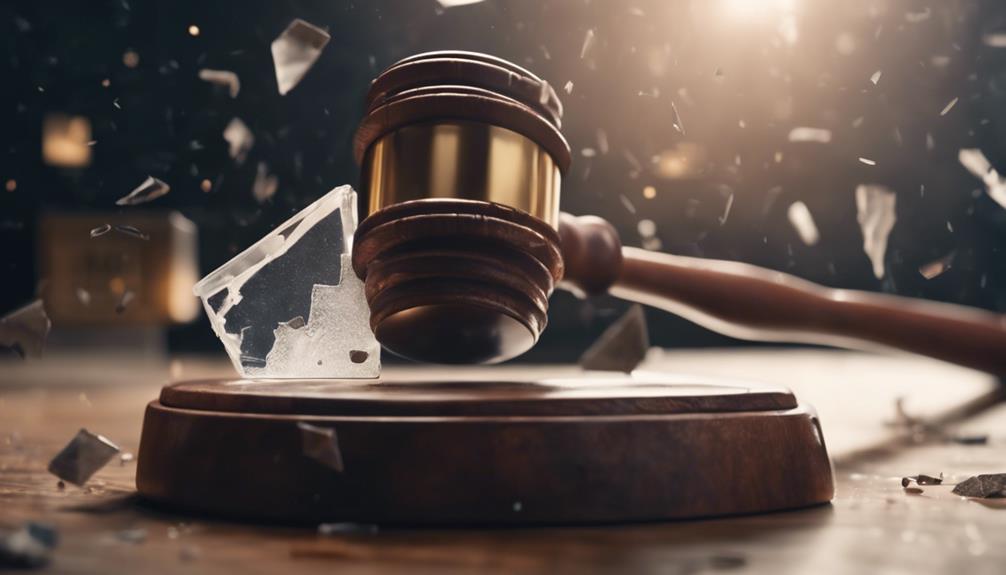
As a YouTuber, you’re not immune to the risk of committing privacy violations, an issue that could potentially lead to legal repercussions. This realm of liability isn’t solely confined to sensitive content controversies or personal data misuse. It stretches across a broad spectrum of concerns, each bearing its own set of implications.
- Sensitive Content Controversies: This pertains to the unauthorized use or sharing of sensitive information in your content. It could be someone’s private details or a piece of confidential information. You’re required to seek proper consent before disseminating such content.
- Personal Data Misuse: In the digital age, data is gold. But as a YouTuber, you must respect the boundaries of data privacy. Mishandling or misusing your subscribers’ personal data can lead to severe consequences both legally and reputationally.
- Invasion of Privacy: This can occur when you capture someone in your video without their consent, particularly in a situation where they’ve a reasonable expectation of privacy.
False Advertising and Endorsements
As a YouTuber, you must be cautious about false advertising and endorsements. Misleading product promotions can land you in hot water, leading to significant legal consequences.
It’s crucial to understand the repercussions of improper endorsements and how to avoid them.
Misleading Product Promotions
In the realm of YouTube content creation, you’re potentially opening yourself up to legal action if you engage in misleading product promotions, also known as false advertising and endorsements. This can result in influencer liability, where you’re held responsible for promoting a product or service dishonestly. It’s crucial to maintain sponsorship transparency, to avoid misleading your audience.
- False Claims: If you make inaccurate claims about a product’s capabilities, you’re misleading your audience.
- Undisclosed Sponsorship: If you’re paid to promote a product without disclosing it, this can be seen as deceptive.
- Unverified Claims: Promoting a product based on unverified claims can land you in legal trouble.
Stay informed, honest, and transparent to protect yourself, your brand, and your viewers.
Legal Consequences of Endorsements
What could be the legal repercussions if you’re caught in the act of false advertising or misleading endorsements on YouTube?
The legal implications are severe. As a YouTuber, you’re bound by endorsement regulations, which mandate transparency and honesty. Breaching these rules can result in hefty fines, litigation, or even channel removal.
Your reputation could also take a hit, causing a decline in viewership and revenue. Furthermore, the aggrieved party could sue you for damages.
It’s not just about legal penalties; it’s about maintaining trust with your audience. In an era craving innovation, deceptive practices are unacceptable. So be aware, tread carefully, and prioritize authenticity over quick gains.
The Risk of Harassment Claims
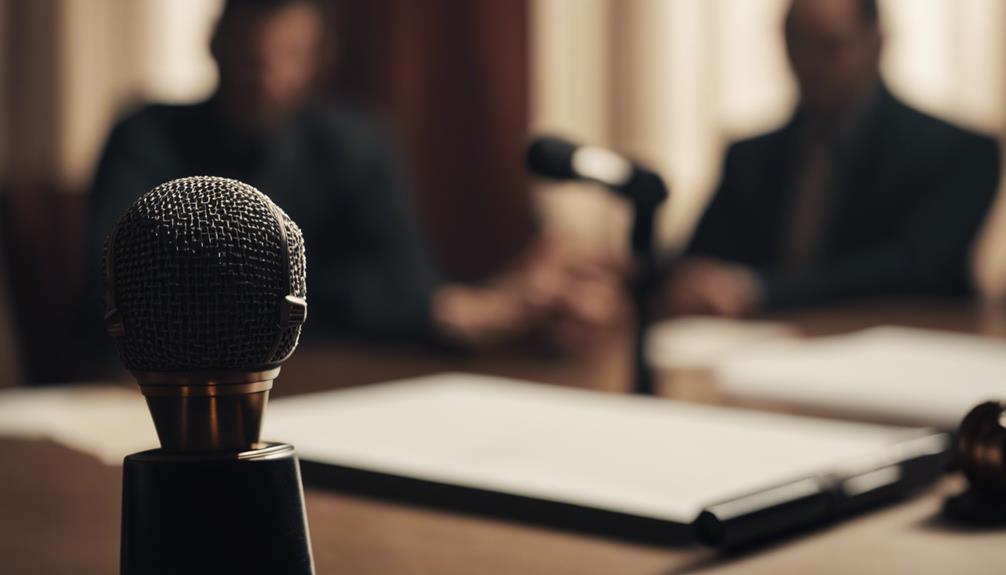
You may not realize it, but harassment claims pose a significant risk to YouTubers. This can range from online bullying consequences to hate speech repercussions, both of which are taken very seriously in the digital sphere.
- Online Bullying: You, as a YouTuber, are in the public eye and your content can attract negative attention. Hateful comments can quickly spiral into online bullying, potentially leading to harassment claims. A single claim could gravely damage your reputation and your channel.
- Hate Speech: Misinterpreted humor or intentionally harmful content can be classified as hate speech. If your content incites violence or spreads prejudice, you’re not just facing backlash from your audience but also potential legal consequences.
- Harassment Claims: They aren’t just about what you say but also how you interact with others online. If you’re found guilty of harassing another individual, this could lead to serious legal consequences, not to mention tarnish your online image.
Being a YouTuber comes with immense power and responsibility. Understanding the potential risks, including harassment claims, is crucial in maintaining a successful channel. Always remember, your words and actions have real-world consequences.
Intellectual Property Disputes
Navigating the complexities of intellectual property disputes can be a challenging aspect of being a YouTuber. It’s vital to understand that violating someone else’s intellectual property rights, either intentionally or inadvertently, can lead to serious legal consequences.
Trademark infringements, for instance, can occur when you use someone else’s registered mark without permission. This can include logos, brand names, or designs that are distinctive to another individual or company. If you’re not careful, your innovative content could potentially infringe on these established trademarks, resulting in legal repercussions.
Plagiarism issues are another common pitfall. This refers to using someone else’s work without proper attribution, essentially passing it off as your own. It’s not just about being ethical; it’s about complying with the law. Using copyrighted music, videos, or images without permission or fair use justification can lead to hefty fines and damage to your reputation.
To navigate the intricate world of intellectual property, you must ensure your content is original, respect the rights of others, and seek legal advice when necessary. Remember, being innovative doesn’t mean you can ignore the rules. As a YouTuber, it’s crucial to balance creativity with legal responsibility.
The Role of YouTube’s Guidelines
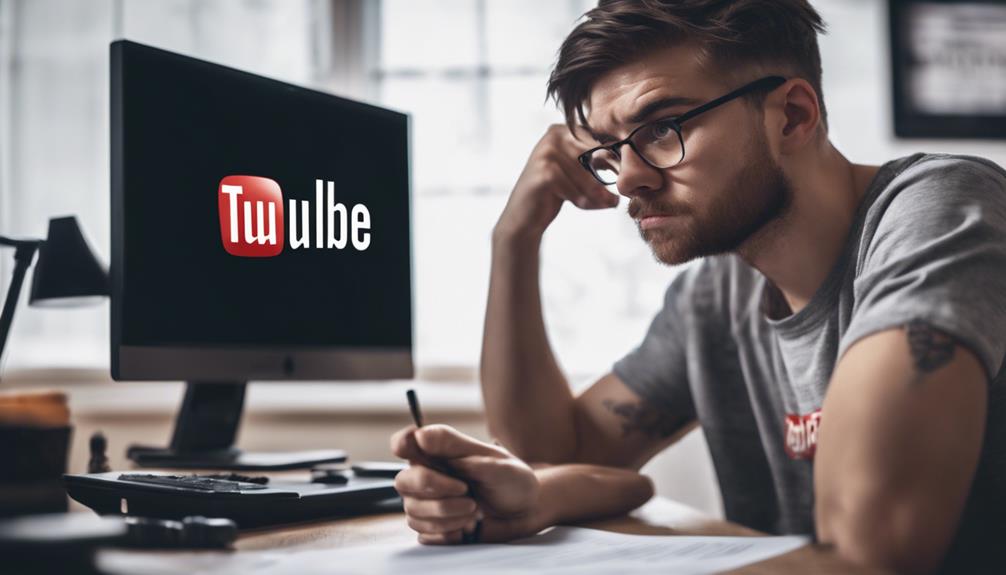
YouTube’s guidelines play a pivotal role in shaping the content creators post, ensuring they adhere to laws and respect intellectual property rights. The impact of community guidelines can’t be overstated; they guide creators to avoid potential legal pitfalls while providing a platform for creativity and innovation.
- Content Regulation: YouTube’s guidelines prevent users from posting content that violates copyright laws, promotes violence or discrimination, or breaks other standards of conduct. This ensures a safe and respectful platform that encourages creativity while respecting the rights of others.
- Policy Enforcement Procedures: When a content creator disregards these guidelines, YouTube has a systematic procedure for dealing with violations. This can range from content removal to account termination, dependent on the severity and frequency of the violation.
- Appeals and Revisions: In the interest of fairness, YouTube allows creators to appeal decisions made regarding their content. This provision empowers creators to voice their concerns, fostering a dynamic and transparent relationship between the platform and its users.
Understanding and abiding by these guidelines is crucial in navigating the platform successfully. As YouTubers, you’re not only creators but also contributors to the innovation and dynamism that YouTube represents.
Protecting Yourself From Lawsuits
Often, steering clear of lawsuits as a YouTuber involves keen understanding and strict adherence to both YouTube’s guidelines and the legal landscape of intellectual property rights. This includes being mindful of copyright laws, recognizing fair use, and avoiding any actions that may lead to contract breaches.
To protect yourself from potential lawsuits, it’s crucial to secure legal indemnity. This provides a safety net, shielding you from the financial consequences of lawsuits. Legal indemnity insurance can cover the costs of your legal defense and any damages awarded to the plaintiff.
Moreover, consider seeking legal counsel, especially when you’re dealing with complex issues or negotiating contracts. They can help you understand the nuances of the law and avoid potential pitfalls.
Also, be mindful of your content. Avoid defamatory remarks, respect privacy, and ensure you have the necessary permissions for any third-party content.

